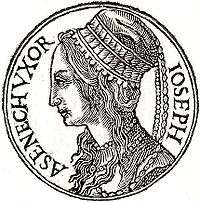Asenath

Asenath, Asenith and Osnat (/ˈæsɪnæθ/, Hebrew: אָסְנַת, Modern ʾAsənat, Tiberian ʾĀsenaṯ) is a figure in the Book of Genesis (41:45, 41:50-52), an Egyptian woman whom Pharaoh gave to Joseph, son of Jacob, to be his wife. The daughter of Potipherah, a priest of Heliopolis, she had two sons with Joseph, Manasseh and Ephraim, who became the patriarchs of the Israelite tribes of Manasseh and Ephraim.
In Hellenistic texts
Genesis records nothing more about Asenath, but her story is elaborated in the apocryphal narrative Joseph and Aseneth. There, she is a virgin who rejects several worthy suitors in favor of Joseph, but Joseph will not have a pagan for a wife. She locks herself in a tower and rejects her idolatry in favor of Joseph's God, Yahweh, and receives a visit from an angel who accepts her conversion. A ritual involving a honeycomb follows. Bees cover her and sting her lips to remove the false prayers to the pagan gods of her past. Joseph now consents to marry her. They have two sons Manasseh and Ephraim.
Pharaoh's son wants Asenath for himself, however, and with the aid of Joseph's brothers Dan and Gad, he conspires to kill her husband. The loyal brother Benjamin interferes, and Pharaoh's son is ultimately slain.
Asenath forgives the conspirators, and she and Joseph rule over Egypt for 48 years, after which they pass the crown to Pharaoh's grandson.
Rabbinical literature
The midrash Pirke De-Rabbi Eliezer records a view that Asenath was actually the daughter of Joseph's sister Dinah, conceived by rape by Shechem.[1] The story says that she was taken by angels to Egypt, where she was adopted. In some versions she is identified by a special plate which Jacob placed around her neck, bearing the name of God and/or the story of her conception.
The name Asenath today
"Asenath" or "Osnat" (Hebrew: אָסְנַת, Modern Osnát, Tiberian ʾåsənaṯ) is a commonly used female first name in present-day Israel. Asenath is also the name of a character in H. P. Lovecraft's short story, "The Thing on the Doorstep."
Notes
| Wikimedia Commons has media related to Joseph and Asenath. |
- ↑ Pirke De-Rabbi Eliezer, chapter 38.